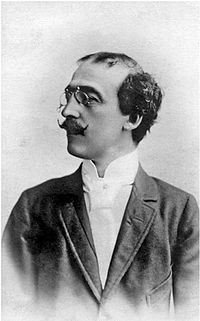Alexandru Macedonski Writer
Alexandru Macedonski (Romanian pronunciation: [alekˈsandru mat͡ʃeˈdonski]; also rendered as Al. A. Macedonski, Macedonschi or Macedonsky; March 14, 1854 – November 24, 1920) was a Wallachian-born Romanian poet, novelist, dramatist and literary critic, known especially for having promoted French Symbolism in his native country, and for leading the Romanian Symbolist movement during its early decades. A forerunner of local modernist literature, he is the first local author to have used free verse, and claimed by some to have been the first in modern European literature. Within the framework of Romanian literature, Macedonski is seen by critics as second only to national poet Mihai Eminescu; as leader of a cosmopolitan and aestheticist trend formed around his Literatorul journal, he was diametrically opposed to the inward-looking traditionalism of Eminescu and his school.Debuting as a Neoromantic in the Wallachian tradition, Macedonski went through the Realist-Naturalist stage deemed "social poetry", while progressively adapting his style to Symbolism and Parnassianism, and repeatedly but unsuccessfully attempting to impose himself in the Francophone world. Despite having theorized "instrumentalism", which reacted against the traditional guidelines of poetry, he maintained a lifelong connection with Neoclassicism and its ideal of purity. Macedonski's quest for excellence found its foremost expression in his recurring motif of life as a pilgrimage to Mecca, notably used in his critically acclaimed Nights cycle. The stylistic stages of his career are reflected in the collections Prima verba, Poezii, and Excelsior, as well as in the fantasy novel Thalassa, Le Calvaire de feu. In old age, he became the author of rondels, noted for their detached and serene vision of life, in contrast with his earlier combativeness.In parallel to his literary career, Macedonski was a civil servant, notably serving as prefect in the Budjak and Northern Dobruja during the late 1870s. As journalist and militant, his allegiance fluctuated between the liberal current and conservatism, becoming involved in polemics and controversies of the day. Of the long series of publications he founded, Literatorul was the most influential, notably hosting his early conflicts with the Junimea literary society. These targeted Vasile Alecsandri and especially Eminescu, their context and tone becoming the cause of a major rift between Macedonski and his public. This situation repeated itself in later years, when Macedonski and his Forța Morală magazine began campaigning against the Junimist dramatist Luca Caragiale'>Ion Luca Caragiale, whom they falsely accused of plagiarism. During World War I, the poet aggravated his critics by supporting the Central Powers against Romania's alliance with the Entente side. His biography was also marked by an enduring interest in esotericism, numerous attempts to become recognized as an inventor, and an enthusiasm for cycling.The scion of a political and aristocratic family, the poet was the son of General Alexandru Macedonski, who served as Defense Minister, and the grandson of 1821 rebel Dimitrie Macedonski. Both his son Alexis and grandson Soare were known painters.
Search
Writer
| Career start | 1866 |
|---|---|
| Career end | 1920 |
| genre | |
| influenced | |
| influenced by | Ernest d'Hervilly Nicolae Moret Blaremberg Ren%C3%A9 Ghil |
| movement |
Alexandru Macedonski on Wikipedia
External resources
- http://cief.elte.hu
- http://cief.elte.hu/Espace_recherche/Budapest/REF8_articles/12SUCIU.PDF
- http://history-cluj.ro/Istorie/cercet/Nastasa/IntelectualiiSiPromovarea.pdf
- http://www.istoria-artei.ro/resources/files/RRHA_2007.pdf
- http://www.mlr.ro/PDF_1/PDF/Eminesciana_Perpessicius.pdf
- http://www.mlr.ro/scriitor.php?id=431&limba=ro
- http://www.plural-magazine.com
- http://www.plural-magazine.com/article_amidst-hen-houses.html
- http://www.plural-magazine.com/article_poesies.html
- http://www.plural-magazine.com/article_thalassa.html
